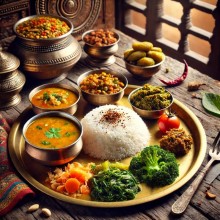In Nepal, the kitchen is the heart of every home. It’s where families gather, where age-old recipes are passed down, and where sustainability can start with just a few mindful changes. The idea of a zero waste kitchen isn’t about perfection it’s about progress. It’s about cooking delicious meals while reducing food waste, reusing ingredients, and making choices that are kind to the planet and to our pockets.
At emajja.com, we believe that sustainable living is achievable for every Nepali household especially when it begins with the food we cook and eat daily. Let’s explore how a zero waste kitchen using Nepali ingredients can transform your cooking and lifestyle.
Why Sustainability Matters in the Nepali Kitchen
Nepal is blessed with biodiversity, fertile lands, and a rich food heritage. But with rapid urbanization and changing consumption patterns, food waste and packaging pollution are on the rise. Practicing eco-friendly cooking in Nepal helps:
- Reduce household waste
- Support local farmers and producers
- Preserve traditional food practices
- Promote healthier, more mindful eating habits
By embracing sustainable cooking practices, we also uphold the values of simplicity and resourcefulness deeply rooted in Nepali culture.
Common Nepali Kitchen Wastes and How to Minimize Them
It’s easy to overlook the waste we produce daily in our kitchens. Some of the most common types of waste in Nepali homes include:
- Vegetable and fruit peels
- Leftover cooked rice or curry
- Expired grains or pulses
- Single-use plastic packaging
- Used cooking oil
Waste management in a Nepali kitchen doesn’t require drastic changes. Here’s how you can start:
- Peels to Plates: Turn veggie peels into flavorful stocks or fry them for snacks. Banana peels can even be used in curries!
- Plan Your Meals: Cook in quantities your family can consume, and reuse leftovers creatively.
- Buy Loose Ingredients: Visit local markets where grains, pulses, and spices are sold unpackaged.
- Oil Disposal: Collect used oil in a bottle and hand it over to recycling programs if available, instead of pouring it down the drain.
Cooking Sustainably with Nepali Ingredients
Nepal’s local produce is incredibly diverse from gundruk (fermented leafy greens) to timur (Sichuan pepper), dal, dhido, and bhatmas (soybeans). Choosing local sustainable food in Nepal supports small-scale farmers and reduces your carbon footprint.
Here’s how you can make your cooking more sustainable:
- Seasonal Eating: Cook what’s in season like kagati (Nepali lemon) in summer or palungo (spinach) in winter.
- Plant-Based Focus: Base your meals around grains, pulses, and vegetables rather than meat-heavy dishes.
- Bulk & Local: Buy in bulk from local co-operatives to avoid packaging waste and support community businesses.
- Fermentation & Drying: Embrace traditional preservation methods like sun-drying vegetables and making pickles.
Composting, Storage, and Reusing Scraps
Waste doesn’t have to go to waste! Composting is one of the most effective ways to close the loop in your zero waste kitchen.
- Kitchen Composting Tips:
- Use a simple bin or clay pot to collect organic waste.
- Mix dry and wet waste for balance.
- Avoid oily or non-biodegradable waste in your compost.
- Smart Storage:
- Use glass jars or steel containers to store lentils, rice, and flours.
- Avoid plastic wraps reuse thungas (cloth wraps) or beeswax wraps.
- Creative Reuse Ideas:
- Turn citrus peels into homemade cleaners.
- Use leftover rice water (maad) as plant fertilizer.
- Reuse spice jars and yogurt containers for storage.
Traditional Practices That Align with Zero Waste
Our ancestors lived a naturally sustainable life. Many traditional practices are examples of eco-friendly cooking in Nepal:
- Banana Leaves as plates during feasts
- Clay pots (gagris and haadis) for cooking and storing water
- Using cloth bags and baskets instead of plastic
- Sun-drying food items to preserve for monsoon and winter
- Leafy vegetables from kitchen gardens right outside the house
Reconnecting with these practices not only reduces waste but also strengthens our cultural identity.
Real-Life Inspiration: Nepali Households Going Zero Waste
Across Nepal, many families are already making small but impactful changes. Like the Karki family in Pokhara who compost all their food scraps and grow herbs in balcony pots. Or Mamata Didi in Bhaktapur who uses every part of the vegetable including stalks and stems to feed her family and her garden.
These inspiring stories show that sustainability doesn’t have to be expensive it just takes intention and creativity.
Final Thoughts: Start Your Zero Waste Journey Today
Creating a zero waste kitchen in Nepal isn’t about achieving perfection overnight. It’s about embracing small, consistent actions that lead to a big impact. From buying local Nepali ingredients to composting kitchen scraps, every step brings us closer to a healthier home and a healthier planet.

-1740465568.jpg)
-1740461640.jpg)


-1740130486.jpg)




